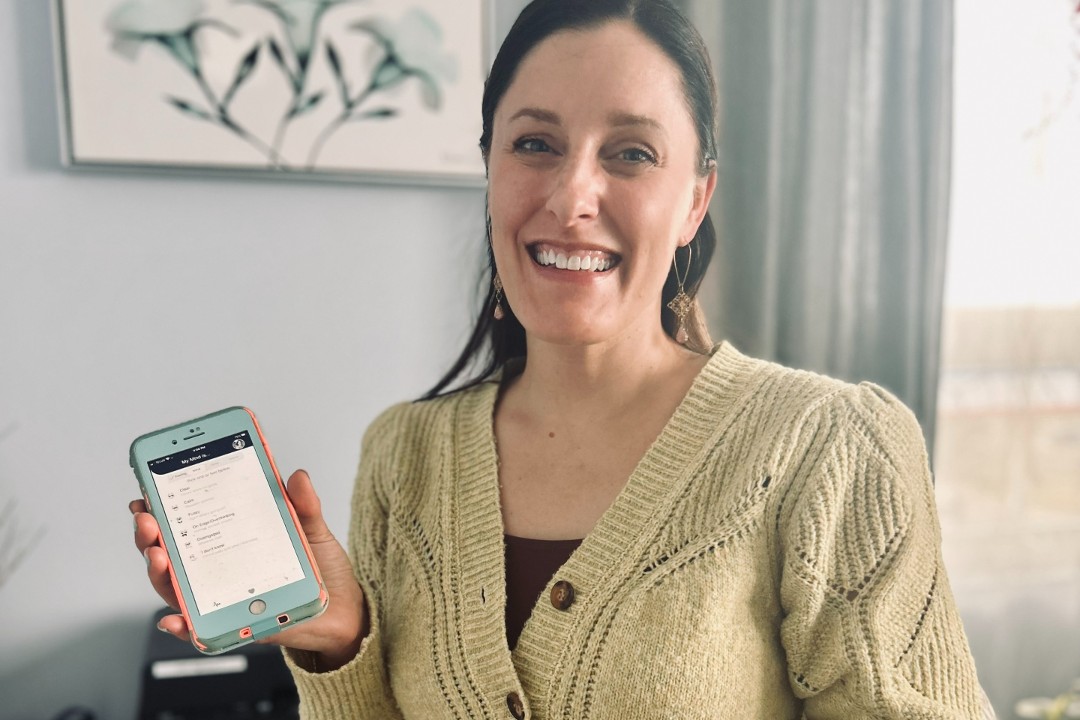A new app from a psychology practice in Spruce Grove is bucking trends in the market by offering support for real-time stress management and emotional regulation.
Dóchas Psychological Services released the free app, called Lifejacket, on May 1.
"What I was looking for was a really simple solution to help clients manage their stress outside of sessions, and sometimes we don't know what we need until we're in that moment," Dóchas founder and registered psychologist Kim Long told Taproot.
Long said that there are two key differences between Lifejacket and market leaders Calm and Headspace, which focus on regular practice.
"We wanted something where daily use wasn't going to be required," she said. "A lot of other apps that are out on the market — which are amazing — (only) focus on one stress-management tactic, like journaling or meditation or positive affirmations. And we wanted to branch out because it's not one-size-fits-all."
Among the varied tactics for stress management are exercises that stimulate all five senses, another element that sets Lifejacket apart, Long said.
"Some of them are really what you would expect, like meditation or having a bath or things like that. But then they also get a little bit more inventive," she said. "Sometimes we need to let out that anger or that frustration, and a really good way to do that is to move furniture or pop bubble wrap."
Other sensory experiences include listening to comedy or specific kinds of music, exposing oneself to favourite smells, breathing strategies, cooking and baking, and more. Users simply fill out four fields — Feeling, Mind, Body, and Sense — and swipe left. The app then generates suggestions with links to things like recipes and playlists.
"If you didn't like any of those (results), you could just swipe back and then swipe forward again … and it should auto-populate some of the ones you saw, but some different options as well," Long said.
The app is for Dóchas clients and non-clients alike. Though the app does list Dóchas's contact info and even has a "book appointment" button, it's completely free to use and available on both iOS and Android.

Dóchas Psychological Services founder Kim Long says her app Lifejacket is just that — a temporary solution for imminent problems that can't replace the counselling experience. (Supplied)
"Originally, it was supposed to be a paid-subscription model. But then as I was developing the app, I started to not feel right about that because it just seemed like so many people could use it," Long said. "(The pandemic) factored into the change from making it a paid-for service into it being free. Because watching people that used to be able to cope no longer be able to cope, that was something that I just couldn't watch anymore."
So far, the app has been downloaded about 130 times. Long said she's measuring its success through users' email subscriptions (which are mandatory but can be cancelled at any time) and through client feedback.
"What we wanted is for people to have something that they can turn to and increase their own self-confidence, too. That, 'Hey, I can handle this situation. I'm not going to sink.' Hence, the Lifejacket thing," she said.
To further the metaphor, Long agreed that a Lifejacket is no substitute for a rescue crew when a ship capsizes. She's not worried about putting herself out of business.
"I really do believe that apps like this serve a purpose, but they are a Band-Aid," she said. "They'll get you through moment by moment, but they don't necessarily help you get down to the root of something and rip it out so that it doesn't consistently bug you anymore. And that's where I think going to see a trained therapist or psychologist or psychiatrist is incredibly beneficial because we are able to ask the deeper questions to help you figure out where you want to go."
Dochás is the Gaelic word for hope, traditionally pronounced "doe-hass" but anglicized to the more phonetic "doe-chas." The practice has been operating since 2016 and currently employs 10 to 12 practitioners, plus interns.
The mental health app market is worth billions, and it's crowded as a result. But Long is patient about getting Lifejacket in front of more users, leaning on help from Edmonton's Fesyk Marketing.
"They believe in building relationships just like we do. So it's really, for me, that grassroots, 'Let's get it out without slapping you in the face with it,'" Long said. "I believe it'll get to the people who need it. It just will be a bit slower, which is OK."
